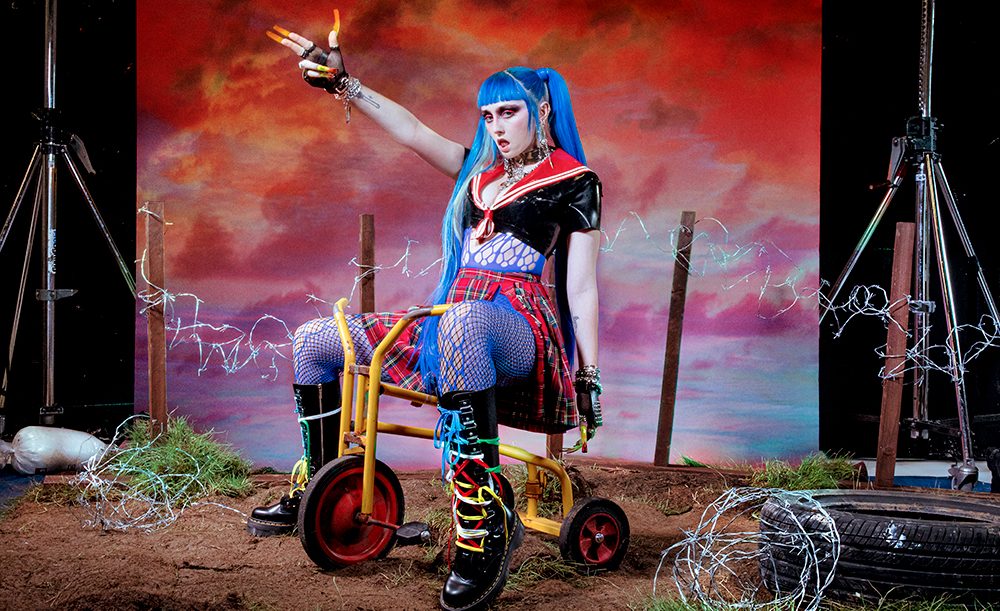Ashnikko
With her new mixtape demidevil, the unapologetic, unabashed, and absolutely unforgettable artist whose music took over TikTok has become the alt-pop powerhouse young women have been waiting for.

This time last year, Ashton Nicole Casey—better known by her stage name, Ashnikko—was living in London, spending her weekends partying in Spain, and certainly not expecting that soon, her furious, fed-up anthems and spitfire style would catapult her into international alt-pop fame.
But along with the pandemic, the lockdowns and the isolation came a sustained burst of online virality that ballooned her cult following into an audience of millions.
“It’s been a whirlwind. It’s been a wild, wild year,” she tells me. “But I’m feeling good.”
She’s fresh off the release of her fiery first mixtape, Demidevil, a much-anticipated follow-up to the irresistible viral hits that propelled her to cyber-stardom. You might not know her face, but if you’ve been on the internet this year, you’ve probably heard her music: after being the subject of mega-viral TikTok trends, her addictive tracks “STUPID” and “Daisy” have racked up 113 million and 163 million Spotify streams, respectively.
“STUPID”, her first TikTok hit, has over two million videos attributed to the sound. Unlike many of the songs that go viral on TikTok, it wasn’t linked to a viral dance or specific trend: instead, the clip of Ashnikko cackling while taunting the stupid boys of the world permeated practically every genre the app had to offer.
Cosplayers used the sound to dress up like sexy, uncanny-valley anime characters, makeup gurus played it while transforming into bright-blue demons or crystal-studded moon goddesses, and thousands upon thousands of users used the song to soundtrack their complaints about their shitty, stupid ex-boyfriends. The clip even inspired countless videos of people dying their hair neon to the sound of Ashnikko’s raspy voice moaning Wet! Wet! Wet! Wet!
“Daisy” had a similar impact, with hundreds of thousands of girls using the song to pantomime cathartic revenge fantasies about curb-stomping abusers and making terrible men pay. While both songs have been used countless times and in countless ways, one theme unites everything they inspired: the girls in those videos all look and feel really fucking good.
“Hating pop music doesn’t make you cool, it makes you an asshole”
With her eye-popping, candy-coloured persona, furious delivery and unabashed anger, Ashnikko has created a body of work that makes teenage girls feel like they’re finally on top. No matter who you are, listening to Ashnikko’s anthems makes you feel like you’re one of her man-slaying, boundary-pushing heroines. Her success on TikTok, a lip-syncing app, makes perfect sense. When girls make videos to her songs, her words are literally coming out of their mouths – and who wouldn’t want to be Ashnikko?
Aesthetically, Ashnikko is a shapeshifter. The only thing that unifies her many personas, costumes and characters – aside from a head of bright blue hair – is the fact that each of them is startlingly, eye-poppingly unique.
From video to video, she’s a CGI’d Y2K Vocaloid, a latex-clad BDSM bumblebee, a sexed-up serial killer, a 40-foot-tall tentacled kraken, a tuxedoed boss jacking off into the camera, and more. Her wildly chaotic creative style might seem random, but her work is defined by the subversion of power. Whether she’s an animated streetfighter, a posse of identical Ashnikko-burglars, or a blue-haired giantess, she always holds all the cards. And this isn’t just onscreen, either.
“I have creative collaborators, of course, but I’m the boss,” she laughs. “I’m a micromanager of everything in regards to my image, which is a lot of work, but I don’t trust anyone else to do it.”
Her carefully crafted persona has a wry, tongue-in-cheek humour that undercuts her every move. It would be easy for 100 million streams to go to anyone’s head, but what sticks out the most when talking to Ashnikko is her dogged dedication to not taking her fame, or herself, too seriously.
“Everybody shits,” she says matter-of-factly, shrugging off a question about her burgeoning role-model status. “Everyone is flawed, and I’m no exception. It’s important to me that my music doesn’t come across as preachy.”
Her online persona reflects this anti-elitist mentality as she maintains an irreverent digital presence. She posts skits on her You- Tube channel, shit-posting on Twitter (“pooping is honestly the best part of my day I swear to god,” reads one particularly iconic tweet), and putting out Instagram posts to her 900k followers that read like Snapchats from your weirdest, funniest friend.
Ashnikko is relentlessly self-aware.
“I’m never gonna sit here and be like, ‘I’m trying to inspire the masses,’” she drawls, her eye roll palpable. “I feel like a lot of artists sit atop a perfect flawless pedestal, which is an impossible standard. It’s not very healthy for anyone, to send out that these people are perfect.”
She’s on a one-woman mission to not give a shit what anyone thinks of her.
Ashton Casey wasn’t always Ashnikko. Growing up in a small, conservative town in North Carolina, there wasn’t much of a place for the brazen, sex-positive feminism that has become both her musical and personal calling card.
“I’m from a very devout Christian family. I’m definitely the heathen of the family,” she laughs. “I’m from a background of very conservative suppression, where you’re told that masturbating is literally a sin from Satan himself, and that you’ll go blind if you do it – literally.”
In her teens, she found Tumblr, a microblogging platform that served as a haven for young feminists in the late 2000s. After spending years in a “highly patriarchal, suppressed” environment, it was through the internet that she began to question her own beliefs.
“There was so much internalized misogyny I had to unpack and question within myself – there’s still a lot of stuff I have to unpack.”
But once again, she’s determined to break down the perfection complex that celebrity culture often demands of young artists.
“I don’t know everything, but that’s okay, it’s okay for me to still be growing. My upbringing wasn’t the greatest, but I’m using the available resources to try and make myself a better person. I’m not perfect. That can’t be expected of me or of anyone.”
But with songs dedicated to abuser-slaying serial killers, female pleasure, bisexuality and the almighty clitoris, it’s no surprise that Ashnikko has come to represent a new generation of in-your-face feminism. The characters she creates don’t take shit from anyone: they call out the stupid guys who don’t make them come, they kill rapists, they dress exclusively in latex and leather.
She identifies strongly with the brat archetype, and her music does too. Many of her tracks sound like schoolyard taunts, as she blows raspberries and thumbs her nose at the patriarchy with sly, defiant humour.
Demidevil has no shortage of fuck-the-patriarchy anthems, but few stand out as much as “L8r Boi”, a feminist flip on the Avril Lavigne classic “Sk8r Boi”. Most of Ashnikko’s audience grew up in the golden age of Avril, and the remix perfectly scratches that nostalgia itch while scaling back the misogyny and doubling down on the skater-hate.
“I went into the studio knowing I had to do an Avril flip. I was like, ‘I don’t care if we can’t get it cleared for the mixtape, I just have to make it’. We took all the lyrics and flipped the ones we wanted, and just gave it a little 21st-century twist. A little less girl-bashing and a little more skater boy-bashing, as it should be. I had the most fun writing that song. And I’ve definitely dated a skater boy who didn’t make me come, so I had lots of inspiration.”
The tape’s other standout is “Slumber Party”, a delightfully vulgar queer anthem that finally gives gay girls the horny banger they deserve. Ashnikko, who currently identifies as pansexual but is still exploring her sexuality, drew inspiration from tired “I kissed a girl” music tropes and personal entanglements to create the track.
“There definitely hasn’t been a lot of good representation for bisexual girls in mainstream music,” she says. “Do you remember that fucking Rita Ora song that came out a couple years ago? “I only like girls when I drink red wine…” When I heard that, I was like, fuck. This is dire. We’re in a dire situation, ladies. Pop music needs better Sapphic anthems!”
And a sapphic anthem is what Ashnikko delivers. Traditionally, female desire in music has been relegated to its perception through the male gaze. Turn on the radio at any time and instantly find a male musician waxing poetic about ass and tits; it’s rare to find similarly erotic anthems by, and for, women.
“I wanted to capture that feeling of just absolutely fucking thirsting for a crush,” Ashnikko explains. “Just thinking, like, ohhhh my god, you have beautiful tits. Oh my god. Just being a little stupid with it.”
The track is inspired by her experience exploring her sexuality in a repressive environment.
“I remember having to tell my mom that I was just having a slumber party with my friend, and then having her take my virginity! And I’ve had my heart broken many, many times by beautiful, beautiful women.”
There’s no doubt that 2020 was Ashnikko’s year. She gained millions of listeners, hundreds of thousands of followers, and established herself as one of the coolest, cleverest artists in the industry. But rising to stardom in the midst of an international pandemic comes with unique downsides. Live performances, which Ashnikko describes as “the best possible energy exchange a musician can have,” are all but impossible, which means that for now, Ashnikko’s fans, her persona and her career all exist almost entirely online.
“It’s disheartening, honestly, because social media makes me feel very poorly about myself. It’s just not good for my brain.”
Ashnikko makes sure to stress how grateful she is for the role TikTok played in making her a mega-star but it’s clear that a year online has taken its toll.
“My mental health has tanked. It’s funny how little I enjoy being on my phone, because basically my whole career is online. But I’ve figured out that I need to find balance and a sense of self that depends on myself, not what the internet thinks of me.
“Almost everything I write is entirely for me,” she continues. “Of course, I’m always hoping that people can gain a sense of confidence and positivity about themselves from listening to my music. But most of the stuff I write is a pep talk, a personal manifestation, a public therapy session.”
Asked how she handles dealing with all the assumptions, expectations and criticisms that the internet has to offer, she laughs.
“I don’t care what the neckbeards of the internet have to say about me, I just don’t give a fuck. Life’s too short. As long as I’m making music that I feel is genuine and comes from a genuine place, I’m fine – all I care about is being authentic to myself.”
She draws on a wide variety of musical influences. Demidevil alone features songs inspired by everything from nu-metal to hyperpop to classic showtunes.
“A lot of people are saying that “Deal With It” is too pop. They’re like, ‘It’s too pop for Ashnikko!! Wahhh!’ and I’m like, I truly don’t give a shit. I’ve been writing pop music since I was 18. Like, fuck off.
“Hating pop music doesn’t make you cool, it makes you an asshole,” she continues, with playful sarcasm. “No one thinks you’re cool for hating pop music. Oh, you hate fun? You hate things that other people like? Okay, whatever, enjoy. Enjoy your life of pessimism. I see what type of life you lead, never getting to listen to Britney Spears. I pity you!”
But even with the priority she gives her happiness and maintaining her sense of self, the detriments of the industry have weighed on Ashnikko this past year. It’s never easy being suddenly thrust into the spotlight, but during a time when logging off means shutting down your whole career, the pressure can become unbearable. For most of our interview, Ashnikko is endlessly positive, finishing each sentence with a joke or a laugh, but she reveals a quiet, scathing intelligence when the conversation shifts to the music industry itself.
“Most of the stuff i write is a pep talk, a personal manifestation, a public therapy session”
“There’s the unspoken thing in the industry: breakups breed the best songs, heartache and sadness bring out the best music,” she says. “It’s part of the reason why a lot of people never heal. Because they’re scared of losing their creative spark. There’s an exploitative nature to that. Not wanting someone get better, just so you can get good songs out of them.
“My healthiest state of being is when I’m drawing boundaries, which means not working as much, turning off my phone sometimes, but that doesn’t fuel the capitalist beast. Taking some time for myself doesn’t further my career, so it’s hard to find people who have your best interests at heart. I have good people around me now, for sure. I’m very lucky. But it’s definitely a thing in the industry keep them sad so they churn out the hits.
“It’s a very inhuman state of being, to have a million people watching you. I don’t think I can keep this up for my whole life. Of course, I’m not complaining – I’m in such a fortunate position. But I have the belief that record labels should be providing mental health services to their artists and staff, and those services should be way more accessible for everyone in general.”
Some of Ashnikko’s critics say she’s nothing more than a two-track wonder who spawned some catchy TikTok dance trends. It’s a criticism that’s rife with elitism and misogyny — why does the fact that teenagers like to dance to her music make it any less exceptional? – but it’s also just so obviously off-base.
Ashnikko is explosive. She creates whole worlds within her tracks and brings them to life with a one-of-a-kind electricity that she’s spent years charging up. On stage, she moves like a cartoon character; online, her endless well of creativity means you never know what she’ll look like next. She’s a bright blue Jolly Rancher; sticky, brighter-than-life, sour enough to make you regret misjudging her but sweet enough to leave you wanting more.
You Might Also Like
NXNE announces free outdoor show, 100-plus more bands
Alex Porat plays Queen West daytime gig, Jane’s Party, High Flyer, Tamir, [...]
By NEXT Magazine








